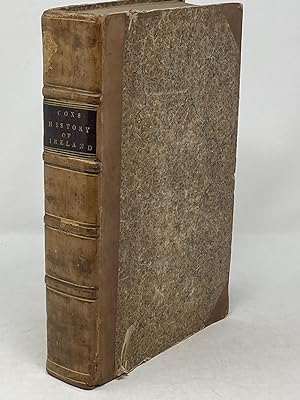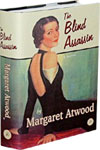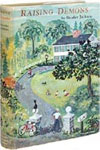HIBERNIA ANGLICANA: OR, THE HISTORY OF IRELAND FROM THE CONQUEST THEREOF BY THE ENGLISH, TO THIS PRESENT TIME. WITH AN INTRODUCTORY DISCOURSE TOUCHING THE ANCIENT STATE OF THAT KINGDOM
Cox, Richard
From
Aardvark Rare Books, ABAA, EUGENE, OR, U.S.A.
Seller rating 5 out of 5 stars
![]()
Heritage Bookseller
AbeBooks member since 1996
About this Item
Description:
Two volumes in one. Quarto, 11.3 in. x 7.5 in., Part I: pp. [46], 456, [4] (index); Part 2: pp. [16], 1-206, 1-72, 1-20, 1-211, [5]. Illustrated with engraved frontispiece and double fold-out map (20 in. x 22 in.) of Ireland.Part II red and black titles. Printed by H. Clark. Contemporary half calf over marbled boards. Gilt title on black panel, and four raised bands, to spine. Rubbing to extremities. Corners rubbed and showing through, One inch surface tears to front and back boards' marbled paper. Silk marker ribbon sewn-in. Previous owners' signatures to front pastedown and top of title page. Hinges and spine are tight; bright, clean interior. Fold-out map in very good plus condition. Sections of this book show extensive manuscript reader's comments and scholarly addendum to printed text. (Who was previous owner, Thomas Strode?). Lovely copy with just a few exterior blemishes. Sir Richard Cox, 1st Baronet PC (25 March 1650 3 May 1733) was an Irish lawyer and judge. He served as Chief Justice of the Common Pleas for Ireland from 1701 to 1703, Lord Chancellor of Ireland from 1703 to 1707 and as Lord Chief Justice of the Queen's Bench for Ireland from 1711 to 1714. Apart from a period in 1691 when he acted as governor of Cork, Cox's subsequent career was at the centre of Irish administration in Dublin. His political views were firmly tory, and his political and professional fortunes mirrored the fate of the tory party and, in particular, his patron Ormond. In 1692 he was made a member of the Irish privy council, and in 1695 a commissioner for forfeitures. He was removed from the privy council in 1695, a move he was later to attribute to his opposition to political concessions to Presbyterians, but which also reflected the declining political fortunes of the tories. He remained a judge, however, and in 1701 was made Chief Justice of Common Pleas. . Before leaving Ireland in 1687, Cox had written two topographical and historical accounts of County Cork and had commenced work on his history of Ireland. It would appear that the publication of Hibernia Anglicana was brought forward in response to the events of 1688 9; the text of the second volume in particular shows signs of bring hurriedly compiled. Although a second edition was published in 1692, Cox never revised the text of Hibernia Anglicana, nor did he complete his account to this present time as he had promised. The range of published and manuscript sources used in Hibernia Anglicana is impressive, if not always discriminating, and Cox succeeds in his declared aim of giving a coherent account of English involvement in Ireland, informed by his unwavering conviction of English cultural and moral superiority. Some of the historical material from Hibernia Anglicana was used again in Essay for the conversion of the Irish (1698) which attempted to convince the remains of the catholic landed élite that they should embrace protestantism in order to become full members of English society. Seller Inventory # 86176
Bibliographic Details
Title: HIBERNIA ANGLICANA: OR, THE HISTORY OF ...
Publisher: Joseph Watts, London, England
Publication Date: 1689
Binding: Hardcover
Condition: Very Good
Edition: First Edition.
AbeBooks offers millions of new, used, rare and out-of-print books, as well as cheap textbooks from thousands of booksellers around the world. Shopping on AbeBooks is easy, safe and 100% secure - search for your book, purchase a copy via our secure checkout and the bookseller ships it straight to you.
Search thousands of booksellers selling millions of new & used books
New & Used Books
New and used copies of new releases, best sellers and award winners. Save money with our huge selection.
Rare & Out of Print Books
From scarce first editions to sought-after signatures, find an array of rare, valuable and highly collectible books.







